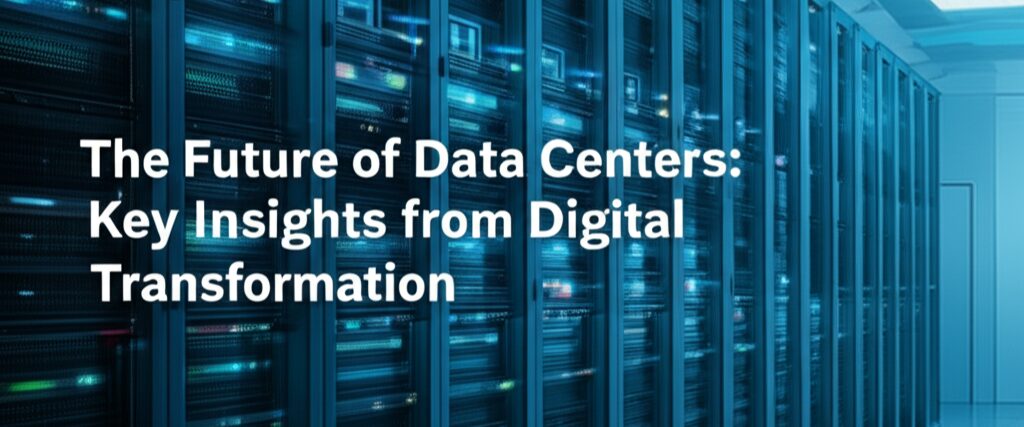As digital transformation continues to redefine the way businesses operate, one component remains at the core of this evolution—the data center. Once known as massive facilities housing servers and storage racks, today’s data centers are intelligent, agile, and foundational to enterprise innovation. The future of data centers is no longer just about hardware—it’s about how companies embrace digital innovation, leverage hybrid cloud solutions, reduce their carbon footprint, and adopt new technologies like AI and edge computing.

Data is the key driver of growth for all types of businesses, and that’s why understanding every aspect of it is crucial to consider. These themes have been central to discussions at every major digital transformation summit, among top digital transformation leaders worldwide. Let’s dive deeper into the insights and trends shaping the future of data centers.
Digital Transformation: A Catalyst for Data Center Evolution
Organizations across industries are adopting new technologies to enhance customer experience, boost productivity, and gain a competitive edge. As a result, data centers must transform in tandem.
Traditionally, data centers focused on centralized storage and uptime. But today, businesses demand real-time data access, intelligent automation, global collaboration, and responsive infrastructure. This shift is forcing a complete redesign in how data centers are structured and operated.
In digital transformation conferences, experts have emphasized that modern enterprises now require infrastructure that can scale, adapt, and support innovation, driving data centers to evolve from static warehouses to agile digital ecosystems.
Key Trends Shaping the Future of Data Centers
1. Hybrid and Multi-Cloud Infrastructure
One of the biggest shifts driven by digital transformation is the move toward hybrid and multi-cloud environments. Businesses are no longer relying on a single hosting provider or cloud vendor. Instead, they blend public cloud services, private cloud setups, and on-premise systems to optimize performance, ensure compliance, and reduce risk.
Future-ready data centers must support seamless integration with multiple cloud platforms. This trend has been highlighted in many digital transformation sessions, where IT leaders have discussed how hybrid cloud models empower organizations with flexibility, agility, and cost control.
2. Edge Computing and the Rise of Micro Data Centers
The rise of edge computing is revolutionizing data center architecture. As data becomes more localized—through IoT devices, smart infrastructure, and autonomous technologies—organizations need processing capabilities closer to the source.
Edge data centers, or micro data centers, are emerging as the solution. These decentralized units enable real-time analytics, reduce latency, and support intelligent applications without sending all data back to the central core.
At a digital transformation summit, experts have agreed that the future of data centers involves a balanced mix of centralized hyperscale centers and localized edge nodes to enable seamless, distributed computing.
3. Sustainable and Green Data Centers
With growing global awareness of environmental impact, sustainability is a non-negotiable aspect of digital infrastructure. Data centers currently consume around 1-2% of the world’s total electricity. Moving forward, companies are expected to prioritize green data centers that use renewable energy sources, energy-efficient cooling systems, and carbon-neutral practices.
From solar-powered campuses to liquid cooling innovations, green infrastructure is becoming a standard requirement. This shift is not just driven by environmental responsibility but also by customer demand and regulatory frameworks.
Thought leaders at every digital transformation conference have echoed the same message—sustainability will be a key differentiator for data center providers in the coming decade.
4. AI-Driven Automation and Smart Operations
Artificial intelligence and machine learning are no longer futuristic—they’re now core to how data centers are operated. AI enhances monitoring, automates repetitive tasks, predicts hardware failures, and enables intelligent workload distribution.
The rise of AI data centers has transformed operations by enabling self-healing environments and predictive maintenance, significantly reducing downtime and manual intervention. These advancements have been central to many digital transformation sessions, where the integration of AI with IT infrastructure is discussed as a critical enabler for modern enterprises.
Virtualization and Infrastructure as a Service (IaaS)
Another major outcome of digital transformation is the shift from traditional, capital-heavy IT infrastructure to virtual, service-based environments. Technologies like virtualization, containerization, and Infrastructure as a Service (IaaS) models allow businesses to scale rapidly, adapt to changing demands, and reduce operational costs.
This shift means that data centers must evolve from being physical assets to value-driven digital platforms that support innovation, resilience, and growth. Providers are now offering more than just storage—they’re offering consulting, compliance, analytics, and fully managed services.
Digital transformation leaders have repeatedly emphasized the importance of agility and scalability—two pillars that are best supported by virtualized, cloud-based infrastructures.
The Role of Data Centers in Business Strategy
The modern data center is no longer a back-end operation—it’s a strategic enabler. The right data center architecture can drive digital agility, improve customer experience, support remote work, and accelerate innovation.
As companies invest in their digital future, they are increasingly guided by insights gained from digital transformation sessions and conferences. These forums provide valuable opportunities to explore best practices, emerging trends, and actionable strategies.
Key takeaways for businesses include:
1. Adopt a hybrid cloud strategy for flexibility and risk mitigation.
2. Integrate edge computing for real-time applications.
3. Invest in green data centers to meet sustainability goals.
4. Leverage AI data centers for smart, automated operations.
Looking Ahead: The Future of Data Centers Starts Now
The future of data centers is being shaped today—through every digital decision, every cloud migration, and every investment in innovation. Enterprises that embrace this transformation are positioning themselves to lead in a digital-first world.
By learning from digital transformation leaders in a digital transformation conference, IT professionals and business executives alike can stay ahead of the curve and make infrastructure choices that support long-term growth.Ultimately, data centers are no longer just about where data lives—they’re about how data drives your business forward. Want to stay ahead in the digital age? Start by joining the conversation at upcoming sessions of the DCCI, a leading Digital Transformation Summit focused on data centers and cloud infrastructure.
